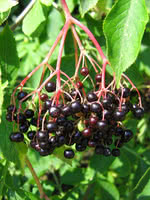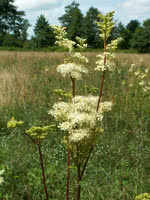Mon-Fri 9am - 5pm Mountain time
Black Elderberry vs Meadowsweet
Sambucus canadensis
Filipendula ulmaria
NOT AVAILABLE THIS SEASON - MIGHT RETURN
CUSTOM GROW
Black Elderberry is a deciduous shrub native to eastern North America. You can plant this shrub in moist areas and it will help stabilize your soil. You can also use it on rural properties anywhere you'd use a lilac.
Black Elderberries are considered to be partially self-pollinating. So while they will still produce some berries without cross-pollination, planting with another variety will increase yields. Consider planting with Ranch Elderberry or Bob Gordon Elderberry.
Warning: the seeds, stems, leaves, roots, and uncooked berries of the Black Elderberry are poisonous to humans when eaten in quantity. You should cook the berries to make them safe for human consumption.
Meadowsweet gets its name from its sweet fragrance from the creamy white flowers. It is a large upright herbaceous perennial shrub. They bloom in early summer, and with the right conditions may remain throughout the season.
Take care of where you’re planting Meadowsweet as it is known to spread.
Black Elderberry Quick Facts
Meadowsweet Quick Facts
Toxicity: leaves, stems, and uncooked berries are poisonous to humans

